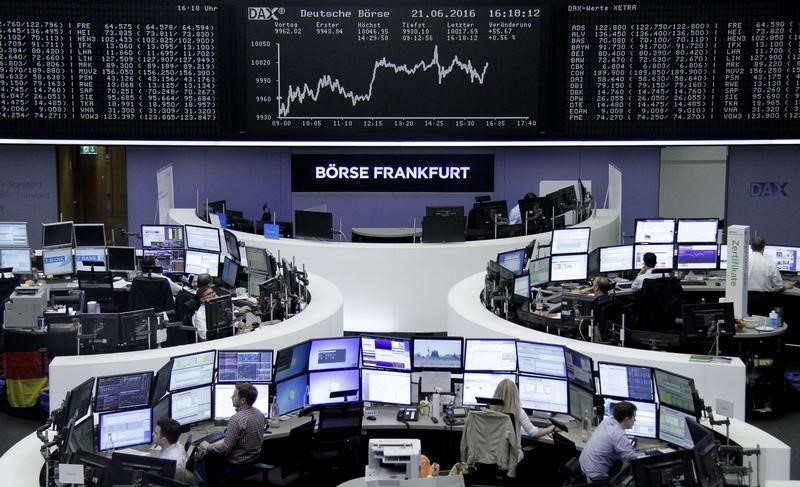By Jamie McGeever
LONDON (Reuters) - Stocks and sterling rose while the safe-haven assets gold and bonds slipped on Wednesday, as investors grew more optimistic Britain would vote to remain in the European Union in its referendum on Thursday.
Riskier markets also drew support from Federal Reserve Chair Janet Yellen's comments on the U.S. economy on Tuesday, when she virtually ruled out a July interest rate hike.
Europe's FTSEuroFirst index of 300 leading shares was up 0.6 percent, Germany's DAX was up 1.1 percent, France's CAC 40 up 0.9 percent and Britain's FTSE 100 up 0.8 percent.
Basic resource stocks were among the biggest gainers in Europe, lifted by an increase in the price of oil almost 1 percent.
U.S. futures pointed to a rise of 0.2 percent at the open on Wall Street, following Tuesday's 0.27 percent gain by the S&P 500 Index.
MSCI's broadest index of Asia-Pacific shares outside Japan rose 0.5 percent, its fourth straight daily gain, but a strong yen caused Japan's Nikkei to fall 0.6 percent.
The strength of the yen, often considered a safe haven, countered the broader increase in risk appetite across financial markets a day before Britain's EU referendum.
"In recent sessions, markets have been reacting to every indicator, opinion poll and betting odds alike. Sterling, the FTSE 100 and the gilt market are all (relatively) flat, leveling off from some of the cautiously optimistic rallies earlier in the week," said Dean Turner, economist at UBS Wealth Management.
JULY BETS COOL
Sterling rose around 0.5 percent against the dollar, climbing above $1.47 and edging back towards Tuesday's $1.4781. The pound has risen 5 percent since dropping to a three-month low of $1.4010 on Thursday.
Betting patterns with bookmakers have shown a re-opening of the gap in favor of "Remain" after the murder last week of a pro-EU lawmaker appeared to derail the "Leave" campaign.
For the latest Reuters news on the referendum including full multimedia coverage, click.
Fed chief Janet Yellen said on Tuesday the risk of Brexit was something that needed watching "very carefully", but she added that the central bank's ability to raise interest rates this year may hinge on a rebound in hiring.
"Yellen struck a cautious tone in her testimony to the Senate Committee, tempering expectations of an interest rate hike in July," said Ana Thaker, market economist at PhillipCapital UK. "Yellen said it was a case of 'whether' the economy would strengthen, not necessarily when."
The dollar slipped 0.2 percent against the yen to 104.58 yen, and the euro rose 0.4 percent to $1.1290.
European Central Bank President Mario Draghi said on Tuesday that Britain's referendum was adding uncertainty to markets, and that the ECB was ready to act with all instruments if necessary.
As investors grew more hopeful of a "Remain" vote, spot gold languished, falling 0.2 percent to a near-two-week low of $1,262 an ounce.
On the other hand, oil prices extended their recovery after news of a larger-than-expected withdrawal from U.S. crude stockpiles.
Crude inventories fell by 5.2 million barrels for the week ended June 17, the American Petroleum Institute said. The trade group's figures were triple the withdrawal of 1.7 million barrels forecast by analysts in a Reuters poll. API/S
Brent crude futures advanced 0.4 percent to $50.80per barrel. The new benchmark August contract for U.S. crude futures rose 0.5 percent to $50.10.
Bonds were marginally weaker, with the yield on 10-year UK gilts up two basis points to 1.31 percent. Longer-dated yields on U.S. and German bonds inched up, too.

Benchmark 10-year U.S. bonds were flat at 1.69 percent. Germany's 10-year yield edged up a basis point to 0.06 percent.